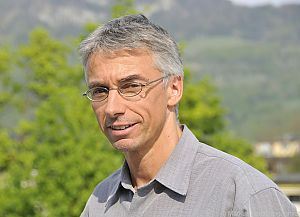Salzburg geoinformatician Thomas Blaschke is one of the world's most cited researchers

The list of the most cited researchers ("Highly Cited Researchers 2021") recently published by the Institute for Scientific Information (ISI) lists 6,600 scientists from more than 70 countries. How often a paper is cited by other colleagues in the field is considered a measure of the scientific relevance of a researcher's work, along with the number of publications in journals.
The Institute for Scientific Information (ISI), which belongs to the data company Clarivate, used scientific papers published and cited in the period from 2010 to 2020 for its analysis. Highly Cited Researchers" are all researchers who rank in the top one percent of their scientific field and have thus exerted a significant influence on their field.
Thomas Blaschke is in the "Cross Field" category. This area for cross-disciplinary work includes people who have had a strong influence on several scientific fields.
Blaschke, a geoinformatics specialist, is involved in Big Data analyses for humanitarian aid, among other things. His research interests generally focus on the integration of methods and domain knowledge into spatial analysis and GIS-based spatial decision support systems. His work has been cited over 10,000 times, the most cited (2,600 times) being his publication "Object based image analysis for remote sensing".
"The award naturally motivates us to continue working hard. In particular, interdisciplinarity is honoured here. This is often problematic: which scientific discipline should I tick in a research proposal? Commuting between basic and applied research also pays off - I think also for Salzburg as a location," says Blaschke.
Most of the most influential researchers work in the USA. With 2,600 researchers, they make up almost 40 percent of all the people on the list. However, their share is falling; in 2018 it was still 43 percent. China, on the other hand, is catching up fast, nearly doubling its share since 2018 to 14 per cent. There are currently 935 researchers on the list. The United Kingdom (492), Australia (332) and Germany (331) follow in the other places. With 43 researchers working in Austria, Austria's global share of the scientific elite is 0.7 per cent. This is an increase from 2018, when it was 0.6 per cent, "no small feat" as ISI analyst David Pendlebury said in a statement to APA.
With 214 names on the list, Harvard University remains the institution with the highest concentration of most-cited researchers in the world. Close behind comes the Chinese Academy of Sciences (193), followed by Stanford University (122).
Thomas Blaschke was also recently ranked among the top two percent of the world's most important researchers in a ranking conducted at Stanford University based on data from the science platform "Scopus".
Blaschke is a professor of geoinformatics and researches data integration and locational intelligence, particularly in the context of the environment and sustainability.
Contact:
Univ.-Prof. Dr. Thomas Blaschke
IFFB Geoinformatik- Z_GIS
Paris Lodron Universität Salzburg (PLUS)
Schillerstraße 30/III
5020 Salzburg
t.: +43 662 8044 7525
Email: thomas.blaschke@plus.ac.at
